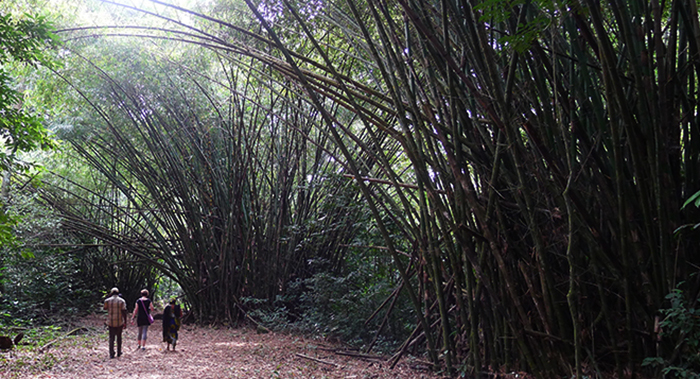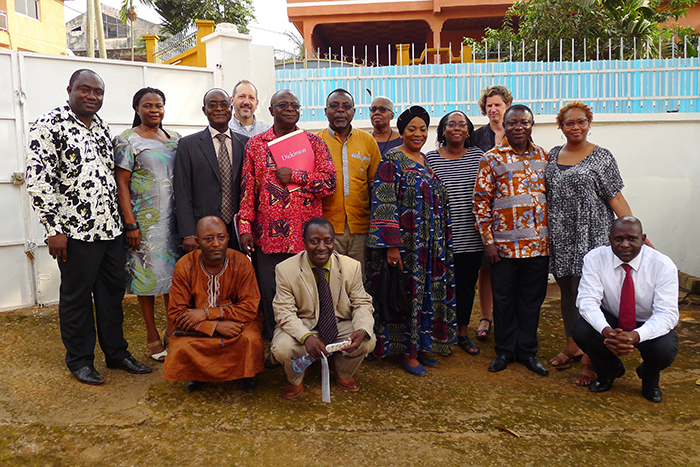Deepening the Experience

Photo by Ed Webb / CC BY.
Faculty, administrators explore new paths in Cameroon
by MaryAlice Bitts-Jackson
Isabel Brown ’16 (history) gained a broader perspective on her major while studying the colonization of West Africa, on West African soil. Jessica Sykes '16 (French and Francophone studies) interned at a Cameroonian newspaper and went on to work for the African Development Foundation. Molly DiLeonardi ’15 (French and Francophone studies) formed a close bond with her homestay family, who then traveled to the U.S. to congratulate her on graduation day. Faith Park ’16 (self-developed major) used study-abroad research grants to conduct research on global public health. She went on to earn a Princeton in Africa fellowship.
Each points to her study-abroad semester in Yaoundé, Cameroon, as a transformative experience. During winter break, three professors and three administrators traveled to that West African country to discuss ways to enhance this signature Dickinson study-abroad program, during Dickinson’s first faculty seminar in Cameroon.
Building on distinction
Founded a quarter century ago, Dickinson’s Cameroon program is one of the oldest, and one of few continuously running, West African study-abroad programs in the nation, says Samantha Brandauer ’95, associate provost & executive director of the Center for Global Study & Engagement (CGSE). Most students live with homestay families, and many volunteer with, or serve internships through, local schools and nonprofits. They take classes at Dickinson’s global study and research center in Yaoundè, and those with French fluency may also enroll at the Université Catholique d'Afrique Centrale (UCAC). Dickinson additionally provides for one UCAC student to study for a semester in Carlisle.
The Dickinson contingent traveled to Cameroon last month to collaborate with faculty and administrative counterparts in Cameroon, exchanging ideas about coursework, projects and programs that would help students best prepare for and process their experiences abroad.
Cross-cultural collaboration

Photo by Ed Webb / CC BY.
Lynn Johnson, associate professor of Africana studies and Cameroon on-campus coordinator; Jerry Philogene, associate professor of American studies; and Ed Webb, associate professor of political science and international studies, attended the Cameroon seminar, along with Joyce Bylander, vice president and dean of student life, and Neil Leary, director of the Center for Sustainability Education.
In addition to brainstorming with local faculty and Dickinson Center staff, they gained a deeper understanding of current programming by visiting major historic and cultural sites and meeting with leaders of local nonprofits and schools who partner with the Dickinson Center to offer students internships and volunteer opportunities. At the end of their visit, they went to the airport to welcome the six students who will be studying Yaoundé this spring and attended several days of the students' orientation.
“It was such a nice and warm greeting after our very long journey,” said Carolyn Goode ’18 (women’s, gender & sexuality studies), who looks forward to learning more about women’s issues in Africa and plans to participate in a Women’s Day celebration in March.
Enduring commitment
The 10-day seminar was sponsored by the CGSE, with funding from two alumnae who are strongly committed to global education. Betty Richardson Churchill ’58 and husband Dan have lived and worked abroad extensively and have supported Dickinson Mosaics, as well as student-faculty excursions and Clarke Forum lectures. Amy Nauiokas ’94, a Dickinson trustee, was an international studies major when she traveled to Cameroon to help launch Dickinson’s West African study-abroad program, as part of an independent-study project. After graduation, she returned to Yaoundé to work in the U.S. Peace Corps office.
Just a month after the seminar, Teku T. Teku, Cameroon program director, reports that its impacts are already felt, as Yaoundè faculty members tweak evaluation styles and teaching techniques based on their conversations with Dickinson counterparts. "The face-to-face discussions enabled many questions to be answered on the spot," he notes.
The seminar's influence will also be felt on campus, as the six participants serve on a Cameroon affinity group, advising on the continuing development of the program. Within a year, they will each have designed or revised a course or program that centers on an aspect of Cameroonian culture, society or history.
Webb will teach a course in African politics after his upcoming sabbatical, and he says that the opportunity to meet with subject experts on Cameroonian soil is helping him think about African politics more broadly as he prepares for that course. The contacts he made in Cameroon also are opening up possible avenues for collaborative research. There are immediate potential benefits for his students as well.
"I think our interactions with local faculty will help our students have even better classroom experiences in-country," Webb explains, "and I feel much better able to advise students who may benefit from the program, because I have a better understanding of the opportunities available to them."
Learn more
Published February 14, 2017